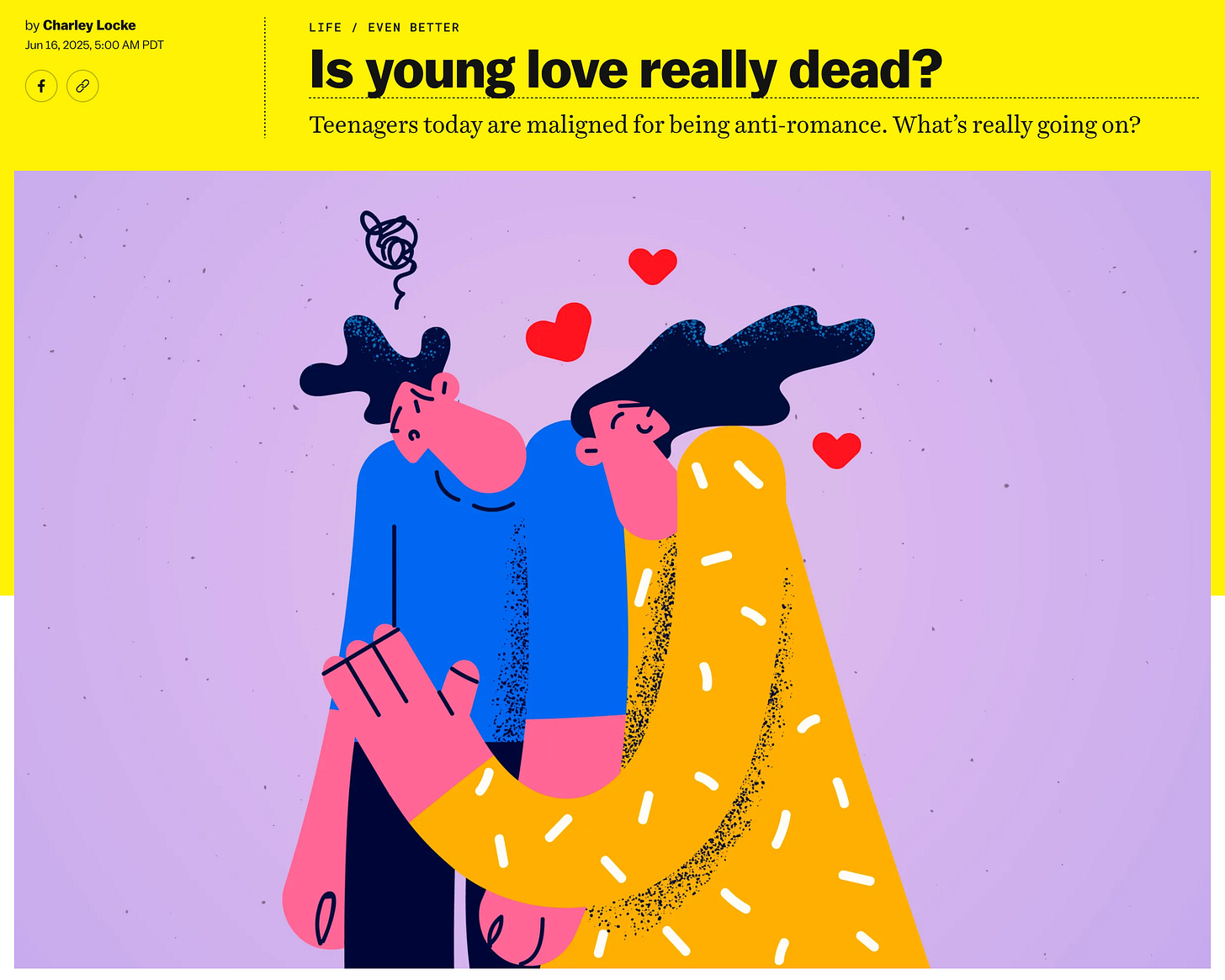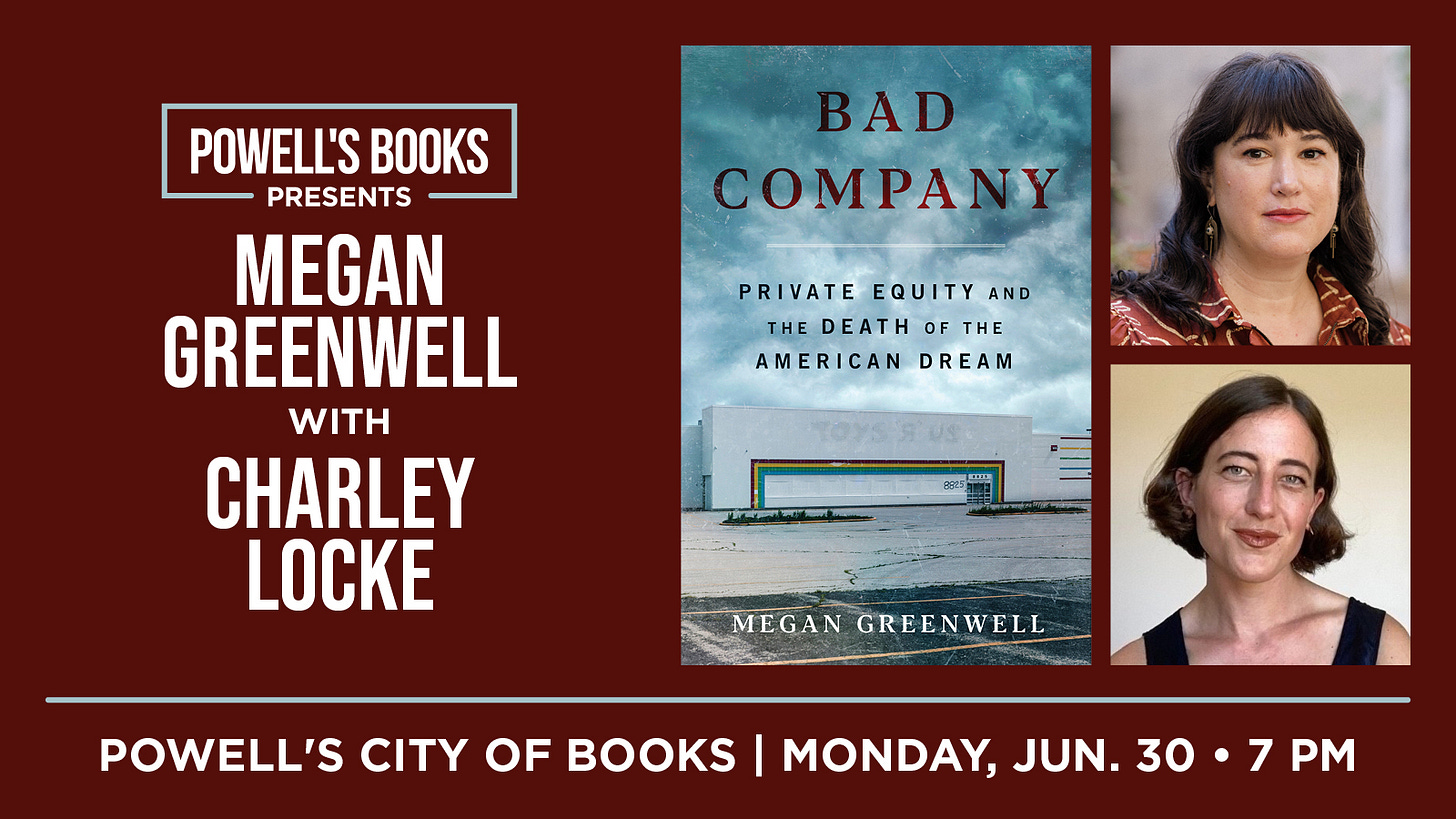Hi readers,
Thanks for subscribing to Travels with Charley. I send this newsletter every month or two, covering what I’m writing, what I’m reading (including lines from my commonplace book), and what I’m wondering. The questions are genuine; write back if you’d like.
What I’m writing
For The Atlantic, I wrote about how the Trump administration is making life worse for aging Americans—and why it’s bad news for everyone who’s getting older, including seniors with financial security and those of us who aren’t seniors yet.
I’ve read the reports from experts about how teenagers today are experiencing dating, romance, intimacy, and connection way less. As always, I was curious about what teenagers themselves thought and experienced. So I asked them (for Vox).
Are you in Portland? Are you looking to feel righteous anger? Do you like books? Want to hear more funny stories about teaching journalism to teenagers in New Jersey dorms?
If yes, come to Powell’s on June 30 as I interview Megan Greenwell, my friend, colleague, and summer camp roommate, about her brilliant new book Bad Company. The book is so well-done: enraging, compelling, and diligent. I generally don’t read nonfiction and I could only put it down to text Megan an ongoing series of exclamation points.
What I’m wondering
I recently spent a week in Berlin, exploring the city with a close friend. I was struck by how much the history of the 20th century feels present and constant there: in the stolpersteine stones before hotels and restaurants, in the concrete windowless bunkers repurposed to house techno clubs and art collections, in the crawling greenery that reclaims vast GDR apartment blocks. It’s present in conversations there, too: I talked to my German counterparts about how they grew up with a vivid sense of history, of lessons learned from what their country perpetuated in the last century.
It made me consider how I understood history—and my role in it—as a kid, and how I think about it now. I’d be curious to hear how you think about that for yourself.
What I’m reading
on our other selves and choice:
Lucy Grealy, in a letter to Ann Patchett (Truth & Beauty):
Sometimes I feel real calm and wise and accepting and other times I’m totally on edge. When I wear the guise of alienated poet I do okay; everything seems if not actually good, at least placable. When I try and wear the guise of a woman, it’s a disaster.
Justin Taylor, from Reboot:
I was going to do it—for the money, sure, but more than that, because I was lonely and bored and adrift in inclement middle age, and I wanted to spend time with my hot famous friends who had known me and pretended on TV to be my family back when I was hot and famous, too.
Marilyn Monroe, in her last interview:
When you’re famous, you kind of run into human nature in a raw kind of way. It stirs up envy, fame does. You’re always running into people’s unconscious.
Sheila Heti in an interview in the Los Angeles Review of Books:
When I was younger, I was obsessed with the idea that I couldn’t live every life—it seemed so unfair to be born only to be forced to live one narrow life. It seemed like such a stupid waste of existence, to only exist as a single person. My fears about not experiencing motherhood—and therefore not being able to write from that position—were as much about feeling that I needed to experience a kaleidoscope of human realities to know what life is, and therefore to write about it.
But the older I get, the more I feel like it’s interesting and significant that we only get to be this one person. Life seems more tragic, and poignant, and sad, and exhilarating, and odd this way. I now feel like the limitation of life is the essence of a human life. It’s not a bug in the program that we’re stuck being ourselves.
Lawrence Wright, from God Save Texas:
I drove back to Austin, under a Turneresque sunset with a gibbous moon rising from a bank of pink clouds. A herd of Black Angus cattle moved like shadows in the places where the buffalo once grazed. I thought about how unintentional most of life is. Part of me had always wanted to leave Texas, but I had never actually gone. Sometimes we are summoned by work or romance to move to another existence, and for me those moments where there is no reasonable alternative to departure have always been joyful, full of a sense of adventure and reinvention. Staying is also a decision, but it feels more like inertia or insecurity. Most of the time I live in a state of vague discontent, tempted by the vision of another life but unwilling to let go of the friends and daily habits that fill my time. When I am in other states or countries, I’m always aware of being in exile from my own culture, with all its outsized liabilities. I wish I lived in the mountains of Montana or on the Spanish Mediterranean. I wish I had a condo in a high-rise overlooking Central Park, with a piano by the window. These thoughts have been at play in my imagination for decades. Now here I was, on a darkening highway in Texas, with so much more road behind me than what lay before.
yours,
Charley







